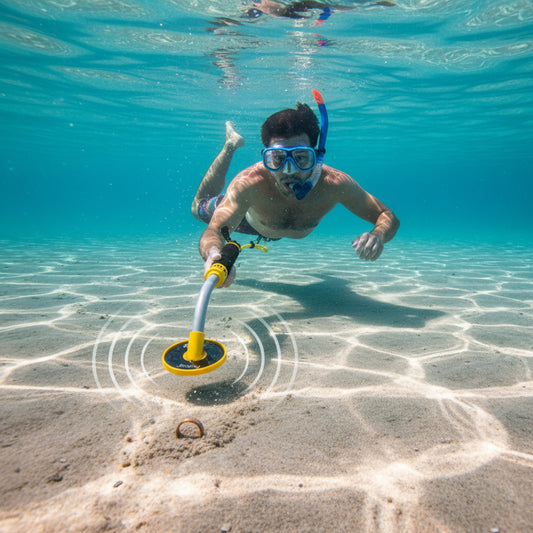
Are There Laws Against Metal Detecting? A Comprehensive Guide
Share
Metal detecting is an exciting hobby that combines the thrill of treasure hunting with outdoor exploration. However, before you grab your detector and start digging, it's crucial to understand the legal framework surrounding this activity.
So, are there laws against metal detecting? The short answer is yes, but the specifics can vary widely depending on your location and the type of land you're searching.
Let's dive into the details of metal detecting laws and regulations.
General Legal Considerations
While metal detecting itself is not illegal in most countries, there are numerous laws and regulations that govern where and how you can practice this hobby. These laws are designed to protect historical sites, preserve natural environments, and respect property rights.
Laws on Public Lands

National Parks and Monuments
In the United States, metal detecting is generally prohibited in National Parks and Monuments. The National Park Service strictly regulates these activities to preserve historical and natural resources. Violations can result in fines and even imprisonment.
State Parks
Regulations for metal detecting in state parks vary widely:
- Some states allow metal detecting with permits
- Others prohibit it entirely
- Many have designated areas where detecting is permitted
Always check with the specific state park's management before detecting. The American Metal Detecting Association offers resources on state-specific regulations.
Beaches and Public Areas
Many public beaches allow metal detecting, but local ordinances may restrict or prohibit the activity. Some key points to remember:
- Check local laws before detecting on any beach
- Be aware of tide lines and restricted areas
- Some beaches require permits for metal detecting
Laws on Private Property
When it comes to private property, the general rule is simple: always obtain permission from the property owner before metal detecting. This applies to:
- Residential properties
- Farmland
- Private beaches
- Any privately owned land
Detecting on private property without permission could lead to trespassing charges.
Historical Sites and Archaeological Areas
Metal detecting on registered historical sites or known archaeological areas is often illegal without proper permits and supervision. In the United States, the Archaeological Resources Protection Act governs the discovery of artifacts on federal lands.
International Laws
If you're planning to metal detect abroad, be aware that laws can vary significantly between countries:
- In the UK, the Treasure Act 1996 requires reporting potential treasure finds
- Some European countries require permits for metal detecting
- Others, like Poland, prohibit metal detecting without special archaeological permissions
Always research local laws before metal detecting in a foreign country.
Specific Regulations to Be Aware Of When Detecting

Depth Restrictions
Some areas have laws limiting how deep you can dig. For example, many beaches restrict digging to 6 inches or less.
Time Restrictions
Certain public areas may have time restrictions on when metal detecting is allowed.
Artifact Reporting
Many jurisdictions require the reporting of significant historical or archaeological finds. The Portable Antiquities Scheme in England and Wales is a good example of such a system.
Best Practices to Stay Legal
- Research local laws and regulations before detecting in a new area
- Obtain necessary permits and permissions
- Join a local metal detecting club for guidance and support
- Keep detailed records of your finds and where they were discovered
- Report significant historical finds to local authorities or museums
Environmental Considerations

While not always legally mandated, responsible metal detecting includes:
- Filling in all holes you dig
- Removing any trash you find
- Respecting protected flora and fauna
- Staying on designated paths when possible
The Federation of Metal Detector and Archaeological Clubs provides a comprehensive code of ethics for responsible detecting.
Consequences of Violating Metal Detecting Laws
Violating metal detecting laws can lead to serious consequences:
- Fines
- Confiscation of equipment
- Bans from public lands
- Criminal charges in severe cases
Conclusion: Responsible Metal Detecting
While there are indeed laws against certain aspects of metal detecting, responsible enthusiasts can still enjoy this rewarding hobby. By understanding and following local laws, respecting property rights, and adhering to ethical guidelines, you can ensure your metal detecting activities remain legal and enjoyable.
Remember, the true value of metal detecting often lies not in the monetary worth of finds, but in the thrill of discovery, the connection to history, and the enjoyment of outdoor exploration. By practicing responsible metal detecting, you contribute to the positive image of the hobby and help ensure its continuation for future generations.
Whether you're searching for coins on a beach, exploring old homesteads for historical relics, or hoping to uncover buried treasure, always prioritize legality and respect for both property and history. With this approach, you can confidently enjoy your metal detecting adventures, knowing you're on the right side of the law.




